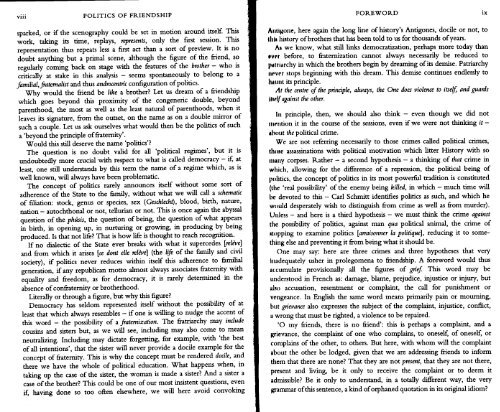Derrida – The Politics of Friendship - Theory Reading Group at UNM
Derrida – The Politics of Friendship - Theory Reading Group at UNM
Derrida – The Politics of Friendship - Theory Reading Group at UNM
Create successful ePaper yourself
Turn your PDF publications into a flip-book with our unique Google optimized e-Paper software.
viii<br />
POLITICS OF FRIENDSHIP<br />
FOREWORD<br />
ix<br />
sparked, or if the scenography could be set in motion around itself This<br />
work, taking its time, replays, represents, only the first session. This<br />
represent<strong>at</strong>ion thus repe<strong>at</strong>s less a first act than a sort <strong>of</strong> preview. It is no<br />
doubt anything but a primal scene, although the figure <strong>of</strong> the friend, so<br />
regularly coming back on stage with the fe<strong>at</strong>ures <strong>of</strong> the brother - who is<br />
critically <strong>at</strong> stake in this analysis - seems spontaneously to belong to a<br />
familial,ft<strong>at</strong>ernalist and thus androcentric configur<strong>at</strong>ion <strong>of</strong> politics.<br />
Why would the friend be like a brother? Let us dream <strong>of</strong> a friendship<br />
which goes beyond this proximity <strong>of</strong> the congeneric double, beyond<br />
parenthood, the most as well as the least n<strong>at</strong>ural <strong>of</strong> parenthoods, when it<br />
leaves its sign<strong>at</strong>ure, from the outset, on the name as on a double mirror <strong>of</strong><br />
such a couple. Let us ask ourselves wh<strong>at</strong> would then be the politics <strong>of</strong> such<br />
a 'beyond the principle <strong>of</strong> fr<strong>at</strong>ernity' .<br />
Would this still deserve the name 'politics'?<br />
<strong>The</strong> question is no doubt valid for all 'political regimes', but it is<br />
undoubtedly more crucial with respect to wh<strong>at</strong> is called democracy - if, <strong>at</strong><br />
least, one still understands by this tenn the name <strong>of</strong> a regime which, as is<br />
well known, will always have been problem<strong>at</strong>ic.<br />
<strong>The</strong> concept <strong>of</strong> politics rarely announces itself without some sort <strong>of</strong><br />
adherence <strong>of</strong> the St<strong>at</strong>e to the family, without wh<strong>at</strong> we will call a schem<strong>at</strong>ic<br />
<strong>of</strong> fili<strong>at</strong>ion: stock, genus or species, sex (Geschlecht), blood, birth, n<strong>at</strong>ure,<br />
n<strong>at</strong>ion - autochthonal or not, tellurian or not. This is once again the abyssal<br />
question <strong>of</strong> the phUsis, the question <strong>of</strong> being, the question <strong>of</strong> wh<strong>at</strong> appears<br />
in birth, in opening up, in nurturing or growing, in producing by being<br />
produced. Is th<strong>at</strong> not life? Th<strong>at</strong> is how life is thought to reach recognition.<br />
If no dialectic <strong>of</strong> the St<strong>at</strong>e ever breaks with wh<strong>at</strong> it supercedes [relive]<br />
and from which it arises [ce dont elle relive] (the life <strong>of</strong> the family and civil<br />
society), if politics never reduces within itself this adherence to familial<br />
gener<strong>at</strong>ion, if any republican motto almost always associ<strong>at</strong>es fr<strong>at</strong>ernity with<br />
equality and freedom, as for democracy, it is rarely determined in the<br />
absence <strong>of</strong> confr<strong>at</strong>ernity or brotherhood.<br />
Literally or through a figure, but why this figure?<br />
Democracy has seldom represented itself without the possibility <strong>of</strong> <strong>at</strong><br />
least th<strong>at</strong> which always resembles - if one is willing to nudge the accent <strong>of</strong><br />
this word - the possibility <strong>of</strong> a ft<strong>at</strong>erniz<strong>at</strong>ion. <strong>The</strong> fr<strong>at</strong>riarchy may include<br />
cousins and sisters but, as we will see, including may also come to mean<br />
neutralizing. Including may dict<strong>at</strong>e forgetting, for example, with 'the best<br />
<strong>of</strong> all intentions', th<strong>at</strong> the sister will never provide a docile example for the<br />
concept <strong>of</strong> fr<strong>at</strong>ernity. This is why the concept must be rendered dodle, and<br />
there we have the whole <strong>of</strong> political educ<strong>at</strong>ion. Wh<strong>at</strong> happens when, in<br />
taking up the case <strong>of</strong> the sister, the woman is made a sister? And a sister a<br />
case <strong>of</strong> the brother? This could be one <strong>of</strong> our most insistent questions, even<br />
if, having done so too <strong>of</strong>ten elsewhere, we will here avoid convoking<br />
Alltilt


